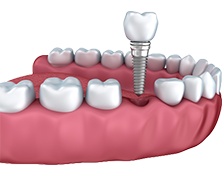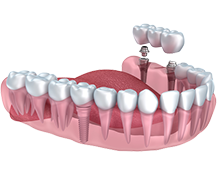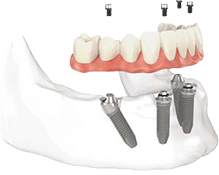The 10 questions that every patient should ask before getting dental implants
When it comes to implant dentistry, Dr. Rapoport has seen it all. “Through my many years of training and experience in implant dentistry, and also from seeing the kind of issues implants develop if the implants and new teeth have not been placed correctly, I have isolated the main factors to look out for when choosing an implant dentist,” says Dr. Rapoport.
(click each question for more information)
Is your implant dentist a Board Certified Specialist?
A periodontist is a dental implant specialist who has taken two to three years of residency training after four years of dental school to learn the proper skills for placing dental implants. To become “board-certified” and then receive “Diplomate” status is earned only after passing a rigorous exam on dental implant procedures and other aspects of periodontics.
Dr. Rapoport and Dr. Schuler are both board-certified and Diplomates of the American Board of Periodontology, a status that only 10 percent of the periodontists in the U.S. have achieved.
Is there a list of the continuing education courses that your dentist has taken in the past 12 to 24 months?
Drs. Rapoport and Schuler regularly attend over 100 hours of continuing education courses each year to keep up-to-date and on the cutting edge.
How long has your dentist been placing dental implants?
Drs. Rapoport and Schuler have been placing implants since 1999. They each have decades of experience with dental implants and stay abreast of all the latest developments in implant dentistry through regular continuing education. After all these years, they often face challenging situations that require the kind of extraordinary experience and skill that only comes with years of experience.
How many dental implants does he or she place a year?
You want the dentist that places your implants to be experienced and knowledgeable in handling the most routine dental implant procedures, as well as the most complex dental implant procedures. There is a difference between someone that places 15 to 50 implants a year and someone that places hundreds a year, like Drs. Rapoport and Schuler do.
What is their training in dental implants?
Drs. Rapoport and Schuler have received extensive 3-year full time implant dental training from the University of Washington School of Dentistry, Seattle and decades of experience placing dental implants. You should always check to make sure your dentist has the proper training, experience and credentials. Experience matters.
Does your dentist offer a comprehensive initial exam prior to diagnosis and treatment?
You should always make sure your initial exam includes the following evaluations: An oral cancer screening, an overall examination of the health of your gums, a complete bite evaluation including patterns of looseness and tooth wear and overall bite function. TMJ function, adequate size and shape of the bone and adequate amounts of gum tissue in the area of the proposed implant are important to check for.
Proper implant preparation involves taking models of your bite and teeth for planning purposes and the creation of a surgical guide (template) that ensures proper implant placement.
Our doctors use your 3D CT scan images to precisely plan the placement of your implant in special implant planning software.
What type of safeguards are in place to protect against infections in Surgical Procedures?
At Pacific Northwest Periodontics and Implant Dentistry, all patients are full-draped for surgery and our team is thoroughly trained in optimal infection control procedures.
How many dental implants does the dentist keep on hand (Inventory)?
Does the dentist have the latest technology to diagnose and treat?
Some of the latest technologies and treatments available that we use to maximize the effectiveness of your treatment include:
- Digital X-rays
- Cone Beam 3D CT Scanner
- Implant Planning Software
- Surgical Guides
- Digital Photos
- A Dental Microscope
Click here to learn more about our state-of-the-art technology
What type and brand of implants does your dentist use, and how dependable are they?
Ask yourself: Do you want an implant from a company that promotes being the low cost leader in dental implants or one that is from a worldwide leading company with 20 years of research and science?
Our doctors use only the highest-quality, time-tested implant components from premium-quality manufacturers. These implants have proven themselves over several decades for long-term stability and biocompatibility.
 Download These Questions as a PDF
Download These Questions as a PDF
(You can download the file immediately and we will also email you a link to the file)
How many teeth do you need to replace?
 A Single Tooth?
A Single Tooth? Multiple Teeth?
Multiple Teeth? All Teeth on One or Both Arches?
All Teeth on One or Both Arches?








